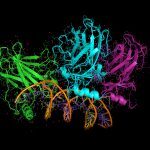Link to Pubmed [PMID] – 27709814
Proteomics 2017 04;17(7)
The ubiquitin-proteasome pathway (UPP) plays a critical role in the degradation of proteins implicated in cell cycle control, signal transduction, DNA damage response, apoptosis and immune response. Proteasome inhibitors can inhibit the growth of a broad spectrum of human cancer cells by altering the balance of intracellular proteins. However, the targets of these compounds in acute myeloid leukemia (AML) cells have not been fully characterized. Herein, we combined large-scale quantitative analysis by SILAC-MS and targeted quantitative proteomic analysis in order to identify proteins regulated upon proteasome inhibition in two AML cell lines displaying different stages of maturation: immature KG1a cells and mature U937 cells. In-depth data analysis enabled accurate quantification of more than 7000 proteins in these two cell lines. Several candidates were validated by selected reaction monitoring (SRM) measurements in a large number of samples. Despite the broad range of proteins known to be affected by proteasome inhibition, such as heat shock (HSP) and cell cycle proteins, our analysis identified new differentially regulated proteins, including IL-32, MORF family mortality factors and apoptosis inducing factor SIVA, a target of p53. It could explain why proteasome inhibitors induce stronger apoptotic responses in immature AML cells.


